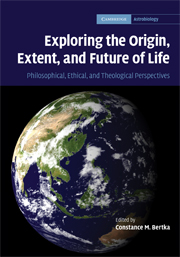 Exploring the Origin, Extent, and Future of Life
Exploring the Origin, Extent, and Future of Life from Part II - Extent of life
Published online by Cambridge University Press: 29 December 2010
There are infinite worlds both like and unlike this world of ours … We must believe that in all worlds there are living creatures and plants and other things we see in this world.
Epicurus (c. 300 bce)There are more things in heaven and earth, Horatio, than are dreamt of in your philosophy.
Shakespeare, Hamlet, Act I, Scene 5We shall not cease from exploration
And the end of all our exploring
Will be to arrive where we started
And know the place for the first time.
T. S. Eliot, Four QuartetsOne of the most basic questions that has been pondered by Natural Philosophers for (at least) the past few millennia concerns humanity's place in the universe: are we alone? This question has been approached from a wide variety of viewpoints, and similar reasoning has led to widely diverse answers. Aristotle believed that earth, the densest of the four elements, fell towards the center of the universe, so no other worlds could possibly exist. In contrast, Epicurus and other early atomists surmised that the ubiquity of physical laws implied that innumerable Earth-like planets must exist in the heavens.
Many aspects of the question of human uniqueness remain ill-constrained, but others have yielded to scientific investigation. Copernicus, Kepler, Galileo, and Newton convincingly demonstrated that the Earth is not the center of the universe, and that other worlds qualitatively similar to Earth orbit the Sun. Telescopic observations, and more recently interplanetary spacecraft, have told us a great deal about these neighboring worlds.
To save this book to your Kindle, first ensure [email protected] is added to your Approved Personal Document E-mail List under your Personal Document Settings on the Manage Your Content and Devices page of your Amazon account. Then enter the ‘name’ part of your Kindle email address below. Find out more about saving to your Kindle.
Note you can select to save to either the @free.kindle.com or @kindle.com variations. ‘@free.kindle.com’ emails are free but can only be saved to your device when it is connected to wi-fi. ‘@kindle.com’ emails can be delivered even when you are not connected to wi-fi, but note that service fees apply.
Find out more about the Kindle Personal Document Service.
To save content items to your account, please confirm that you agree to abide by our usage policies. If this is the first time you use this feature, you will be asked to authorise Cambridge Core to connect with your account. Find out more about saving content to Dropbox.
To save content items to your account, please confirm that you agree to abide by our usage policies. If this is the first time you use this feature, you will be asked to authorise Cambridge Core to connect with your account. Find out more about saving content to Google Drive.